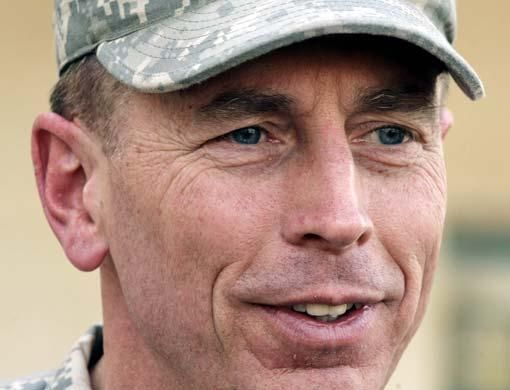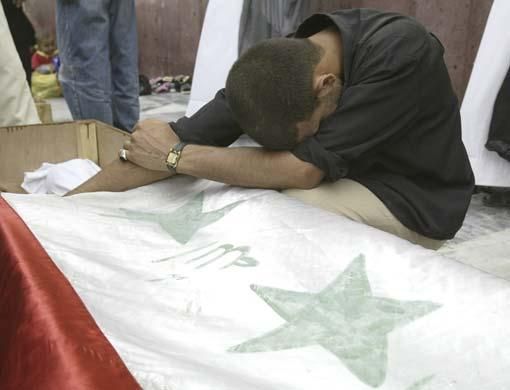The level of violence in Iraq has gone down "considerably" in the past few months, according to General David H. Petraeus, the US Commander in the war-torn country.
In an exclusive interview with Gulf News, he said the Iraqi government was making new plans for the restructuring of the military and police.
"The level of incidents in Iraq now is considerably less than in 2006, and a slight bit less than in 2005," he said. "This is a result of a number of factors, very hard work and courageous actions and sacrifices on the part of Iraqi security forces and the coalition forces."
In many areas, he noted, "the Iraqi people are turning against extremists, in particular Al Qaida". He said the Sunni community was now cooperating with the US forces instead of embracing the armed groups that fight the American and Iraqi forces. However, he admitted that there is an enormous amount of work still to be done, "and certainly in the security arena, politics and reconciliation among Iraqis".
He nevertheless voiced typical optimism and called on those who left their violence-plagued country to come home. "Iraqis in Iraq are shaping their country. Now is the time for Iraqis to return to their country and serve."
Petraeus revealed that a significant number of American forces has already been withdrawn. "We have begun reducing forces, we have pulled 2,200 Marines from Al Anbar province in mid to late September."
Gulf News: When do you believe Iraq will be "normal" and "stable". Is there a sort of time-table for that?
Petraeus: Ramadan is over and the level of incidents is considerably lower than in 2006, and slightly less than in 2005. This is a result of a number of factors. They include very hard work and courageous actions and sacrifices on the part of Iraqi security forces and the coalition forces. It is also the result of the "Shaab Al Iraqi" (Iraqi people), in many areas, turning against extremists, in particular "Al Qaida Al Iraq" in Al Anbar province. This has created a situation in which the government of Iraq and the Iraqis can focus more now on basic services that were damaged by war, violence and looting. Dramatically, these efforts are more evident in Ramadi which once was the stronghold of Al Qaida.
The same phenomenon is apparent in other areas, where much hard work is needed to achieve that level of security.
There is obviously considerable focus on how to move forward with national actions that institutionalise or qualify or complement actions which have taken place at the grassroots level.
For example, there is no word on an oil sharing law, but there is sharing of oil revenues. It is actually relatively along the lines of an oil sharing law. There is no general amnesty, but there is what can be called a conditional immunity in local areas. The shaikhs of various tribes have opposed Al Qaida, insurgents and extremists. They have volunteered to serve in the Iraqi security forces to protect their areas. These individuals are absorbed in the legitimate Iraqi security forces, either in the police or in the army. They have a natural chain of command and their salaries are paid by the government, which in turn provides a degree of reassurance to the local people that they will be protected from Al Qaida attacks.
Clearly there is an enormous amount of work to be done, and certainly in the security arena, politics and reconciliation among Iraqis.
Ambassador Ryan Crocker and I have been told that the security situation is better and that we have had the chance to concentrate on other issues.
The big phenomenon now is Iraqis have said no to more violence, no to Al Qaida and the related insurgent groups associated with them.
They saw what it did to the Euphrates River valley; it destroyed the area. And they do not subscribe to the Taliban ideology. All that Al Qaida brought to the Euphrates river valley was death and destruction. Now what they feel is that it was a mistake not to vote in the elections of 2005, and that yes, that particular group may not run Iraq again but they can most certainly get their share of the resources if they can just stop shooting each other. Many of the people in those areas have lost enough family members and they have said that they want to oppose Al Qaida and they want to tie their horses to the government
Do you think the Sunnis will have a better share in the government in the future?
The Sunnis are not just cooperating with us, they are part of the government. They are tied in the government and very young men are part of the police. Well over 20,000 were hired in the Anbar province, and in other areas as well, and thousands and thousands of others are in the Iraqi army, serving Iraq. Now this is an area where they used to not serve. A year ago no one in Al Anbar province volunteered to serve.
Iraqis in Iraq are shaping their country, now is the time for Iraqis to return and serve their country.
You must be feeling very optimistic. How much better is the situation in Iraq in comparison to a few months ago?
There are still elements of Al Qaida in Iraq and we are going after them every single day, along with the Iraqi security forces. They are focusing more on Iraqi security forces and Iraqi tribal leaders who are apposing them rather than on us, as they see them as the bigger threat to them. Al Qaida is worried. We know of their concerns and about the damage that has been done to them in Al Anbar province as in Baghdad in Amiriyah, Gazaliyya, Aadamiya, Doura in the Arab Al Jubour, in the Yousiffiya, Latifiya, Iskandariya, Mahmoudiya, that used to be called the triangle of death until about three months ago. I was down there the other day, walked around and met the shaikhs, and because the shaikhs have turned against Al Qaida, it is no longer the triangle of death. That type of action changed the fight against Al Qaida in Iraq and you see some of that with respect to the militias who have also caused hardship to the people.
Private military contractors, how do you feel about their presence? Do they take part in US army battles and surges? Can you in any way control their misconduct?
The PMCs who are under the Department of Defence contract, the Uniform Code of Military Justice can and will be extended to them. Blackwater is a contractor for the Department of State, not Defence.
To address what measures should be taken very quickly and other measures over time, in Baghdad we have had a number of meetings among a number of organisations that are connected with this to review procedures, policies, the coordination that is carried out, so that our soldiers know where the PMCs are moving and for coordination to be synchronised, as they carry out their missions. The fact is that there are well over 100,000 PMCs, the majority of which are Iraqi. By the way, those are Iraqis and they carry out a huge array of tasks.
Do you foresee war on Iran? How do you view the situation concerning Iran?
I will not comment on future operations.
We would welcome evidence that Iran is living up to the commitments that senior Iranian leaders have made to senior Iraqi leaders who have gone to Tehran to express their concern about activities carried out in Iraq, and we would like to see what the Iranian leaders have said they would do - which is to stop the training, the fighting, the equipping, the provision of weaponry to militia extremists using these items to kill innocent Iraqis and coalition forces. And there has been some reduction, the certain types of attacks associated with the weapons that come from Iran, most notably the explosives, the penetrators, the improvised explosive devices, 240mm rockets, certain types of RPG 29s, which have been observed as a trend in recent weeks. We would see that as very positive as there has been a reduction in the provision of these weapons.
What is the plan and the timetable for withdrawal from Iraq? Have you actually started the groundwork yet?
We have begun reducing forces. We pulled 2,200 Marines from Al Anbar province in mid to late September. We will reduce - as we briefed the Congress and as the President announced between now and late July 5 - brigade combat teams, two more Marine battalions and the Marine expedition which has actually gone. The British as you know have announced a reduction of their forces in Basra and I went to London and met Prime Minister [Gordon] Brown and his senior leaders and we worked our way through that and the tasks they will perform and discussed the handover there of the security tasks to Iraqi forces and leaders. There will be reductions over time in the coalition contingents.
What in your view will be the fate of the Al Maliki government?
I think it is useful to look at this, and recall some very substantial achievements by the Iraqi people, Iraqi government obviously, two elections, the Constitution, the seating of the new government and re-establishment of new ministries and so forth and doing all that in the face of considerable violence and enormous challenges and then over the course of the past year or so, certainly having passed a certain number of legislations, a budget for Iraq.
The other important development is that they are taking actions in the absence of the laws, such as the sharing of revenues. So they are carrying out the intention of legislation even before they have agreed upon it. So I think it is only fair to the Iraqi government and the Iraqi leaders to recall how fundamental the nature of some of these laws is, and it took my own country years, decades, and centuries to get certain parts of our own existence sorted out.
I also think it is very accurate to say that although there have been certainly some very big and small accomplishments, no one is satisfied with the level of achievements over the past six or eight months or so. Certainly there were expectations by the senior leaders, Mr Al Maliki is not happy, so they have to come together. I do not want to portray it (Al Maliki government) as all smooth, but it is definitely much better than before.
Iraq's Police and Army, they are to be reconstructed in a certain manner, what is your vision concerning numbers, arming and structure?
The plans are Iraqi plans, we certainly support those and we are helping to enable what they want to do, but the Iraqi government makes these decisions. One example is Basra. They saw the gradual reduction of British forces approaching, they saw violence there in some cases. One of the changes in Iraq today is that the locals are volunteering for the police in a way they did not six to eight months ago.
When will the Iraqi army take over?
This is not a night switch. There is not going to be a day when we are going to pass the flag to the Iraqis. What happens is that in a certain area, in Fallujah, we have done it. Fallujah used to be secured by multiple brigades of the first Iraqi army division and Marines. Over time, we reduced the presence of our army and the Iraqi army, now it is just the Iraqi police with local individuals from the neighbourhood helping them, with a Marine gasoline squad with them.
What has been achieved during the four years in Iraq?
The paramount importance of securing the population, in such an operation, and to secure the population, you must live with the population you are securing and that you must gain local assistance in that security effort. The big lesson and idea is about the security of the people.
We have taken the rear mirror off this bus and we are trying to focus on forward.
Where do you see the US in 2008 regarding Iraq?
That is what I told the President and the Congress. By next March I will provide further recommendations and they will depend on the conditions on ground and so forth.
Is the US making use of Iraqi oil?
If we had wanted the Iraqi oil, we would have just sat at home and bought it for the next 50 years with what we have spent. We have spent around $700 billion up till now, and Iraq only produces about $30-$31 billion [of oil] a year.
A distinguished career
General David H. Petraeus assumed command of the Multi-National Force-Iraq on February 10, 2007, following his assignment as the Commanding General, US Army Combined Arms Centre at Fort Leavenworth.
Prior to assuming command at Fort Leavenworth, he was the first commander of the Multi-National Security Transition Command- Iraq, which he led from June 2004 to September 2005, and the Nato Training Mission-Iraq, which he commanded from October 2004 to September 2005.
That deployment to Iraq followed his command of the 101st Airborne Division (Air Assault), during which he led the "Screaming Eagles" in combat throughout the first year of Operation Iraqi Freedom.
His command of the 101st Airborne Division followed a year deployed to Operation Joint Forge in Bosnia, where he was the Assistant Chief of Staff for Operations of the Nato Stabilisation Force and the Deputy Commander of the US Joint Interagency Counter-terrorism Task Force-Bosnia. General Petraeus was commissioned in the Infantry upon graduation from the United States Military Academy in 1974. He was the General George C. Marshall Award winner as the top graduate of the US Army Command and General Staff College Class of 1983.
He subsequently earned MBA and Ph.D. degrees in international relations from Princeton University's Woodrow Wilson School of Public and International Affairs, and later served as an Assistant Professor of International Relations at the US Military Academy. He also completed a fellowship at Georgetown University.















